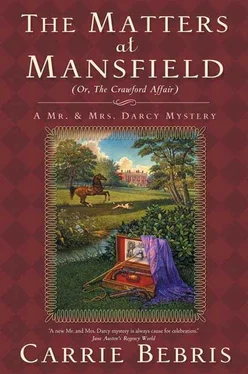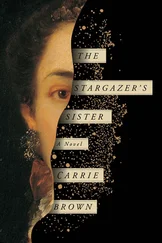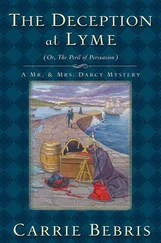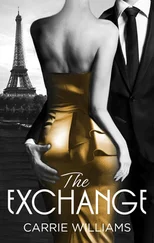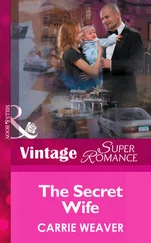Darcy gave the boy a shilling. “If you remember anything else, come tell me.”
“I will, sir!”
As the boy ran off, Darcy looked at Colonel Fitzwilliam. His cousin read his thoughts.
“Weddings and anvils,” the colonel said. “Do you think they are bound for Scotland?”
“It is a long journey. If we are wrong, we lose days chasing false hope.” Darcy did not want to contemplate how much worse the situation would be if they raced all the way to Gretna Green only to discover they had erred. “We cannot even be certain they head for Gretna — the viscount could take them to any Scottish village.”
“We could divide. One of us could stay here.”
“And do what?”
“Feel impotent and torment himself over what might be occurring two hundred fifty miles away.”
His cousin’s response elicited a grim half-smile from Darcy. It was in neither of their natures to remain idle while others acted. “The viscount has a case full of pistols. I think we should both go. And given their advance start, we cannot afford another moment’s delay.”
Darcy did not know what they would find, or what would unfold, when they reached their destination. But based on previous experience, of one thing he was convinced.
Nothing good came of elopements to Scotland.
“I have reached a decision,” Anne announced as she and Elizabeth reentered the carriage after another all-too-brief stop. She spoke in a low voice so as not to be overheard by Antonio, who followed behind, his pistol ever-present but concealed from spectators. “If we survive this, I shall happily spend the rest of my life as a spinster.”
They would survive this. In that, Elizabeth was determined. “No more elopements? I cannot imagine why. This one has been so agreeable that I begin to regret my own mundane nuptials at Longbourn.”
This had been the most grueling journey of Elizabeth’s life. Anxious to reach Scotland before any pursuers caught up with them, and equally anxious lest an opportunity present itself for his abductees to escape, the viscount had traveled through the night and all the next day with only the most abbreviated of stops to change horses. They were even denied meals at the posting inns; to prevent any conversation with employees or other guests, the viscount bought only portable food such as bread and cheese that could be consumed in the carriage. After more than four-and-twenty hours of cramped seating and ceaseless jostling, every muscle of Elizabeth’s body ached.
Yet other than the hardship of prolonged, involuntary travel, the viscount’s treatment of them in general had been fair. He demonstrated the respect due them as ladies, expected his servant to do the same, and himself behaved as a gentleman. He yet considered himself a man of honor; indeed, a great deal of his conversation seemed to derive from a desire to defend his conduct as honorable and prove himself to be yet upholding the tenets by which he had lived his life. That men of honor did not generally kidnap ladies at gunpoint and subject them to an arduous journey with the end purpose of a forced marriage did not seem to trouble him.
The paradox intrigued Elizabeth.
Though more lucid than he had appeared during the period of his deception, the viscount had definitely lost some of his ability to reason. He might not be senile, but he was not altogether sane. And so as they rode, she kept him talking as much as she could — in part to learn more about the events that had been transpiring around them, in part to tire him, and in part to better understand how his mind worked.
Once more on the road, it was an easy matter to bring Lord Sennex back to his tale. She had only to enquire about the viscount’s cherished pistols. “After Mr. Lautus failed in his commission, how did you retrieve the weapons Mr. Sennex had given him?”
“One is in the custody of Sir Thomas; Neville was to have recovered it while staying at Mansfield Park. My useless son, however, could not even succeed at that, and so it remains in Sir Thomas’s possession. I did not know what had become of the other, until entirely by chance I happened upon that loathsome Mrs. Norris prowling around the inn’s privy. It was occupied, and she waited outside. I startled her and she dropped the pistol. I pretended not to notice her kick it under the bushes — a facile deception, when one is already thought to be addled. As she then left without using the privy, I can only presume she planned to discard the pistol down it. A Mortimer pistol! One of the finest he ever made! And she would have dropped it into a hole of—” He emitted a sound of utter disgust. “Stupid, reprehensible woman! I wanted to shoot her with it.
“But I had more important matters at Mansfield. By then, Henry Crawford had returned, providing an opportunity for Neville to finally satisfy his honor. This time, I was present to ensure everything proceeded properly. Because of the previous mishandled duel, secrecy was even more critical, and so participants were minimal. No seconds, no surgeon — only the two primaries and myself, the presiding officer.”
“How did you persuade Mr. Sennex to involve himself directly this time?” Elizabeth asked.
“Upon my instructions, Antonio led Neville to the grove, where he impatiently awaited my arrival, not knowing why he had been summoned. Mr. Crawford required more persuasion. The muzzle of my pistol, however, proved sufficient motivation for him to leave the inn with me and return to the grove.
“When we arrived and I announced what we were gathered there to do, Neville at first dismissed the duel as the scheme of a senile old man. I could see, however, that he indeed wanted satisfaction from Mr. Crawford — he was simply too cowardly to jeopardize his own person to achieve it. But when Mr. Crawford continued to maintain that he was someone named John Garrick and that he had no knowledge of any offense against Neville, his denials so enraged Neville that at last my son was spurred to defend his honor as a gentleman ought.
“Mr. Crawford had no weapon of his own, so I armed him with one of mine — the match to the one I handed to Neville. I retained the small pistol for myself. They stood at a measured distance and were to fire at my word of command.
“As I was about to voice the order, Neville fired. His shot flew so wide that I know not what shamed me more — his premature fire or his pathetic aim. I stared at him, unable to believe my own son capable of such dishonorable conduct.
“But the worst was yet to come. He regarded Mr. Crawford, still holding his cocked pistol, and fear entered Neville’s eyes. My son was so lily-livered that he backed away, looking as if he might run. His cravenness disgusted me. I ordered him to stand his ground and take Mr. Crawford’s fire like a man.
“The sudden realization that I was in full possession of my faculties stunned Neville into submission. Mr. Crawford, however, would not finish the proceedings. He yet claimed that he had no knowledge of the business that had brought us there. His lies to me were nearly as great an insult to my honor as had been his offense against Neville’s. I issued the command to fire; he not only refused, he mocked the gravity of the trial, thereby insulting me further. I ordered him once more to fire or be fired upon. He laughed and ridiculed me. So I brought up my own pistol and silenced him.
“He died quickly — took his final breath just as I reached him to retrieve the pistol from his hand. Neville called over to me, asking whether Mr. Crawford were dead, and I nodded. ‘Capital,’ he said, bravado once more taking hold of him. ‘I am glad to have this ridiculous affair ended.’ Ridiculous, he called it — when minutes before, he could not stand steady for cowardice.
Читать дальше
